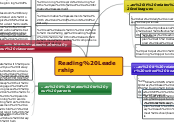Reading Leadership
...as it relates to your colleagues
- share daily conversations and experiences
- have professional conversations about effective strategies for literacy teaching
- co-plan with colleagues and grade level partners
- participate in professional learning opportunities
...as it relates to your school board
- follow SIPSA goals for literacy based on the BIPSA using indicators from the SEF (School Effectiveness Framework
- participate in Board learning opportunities in regards to literacy
- meet and co-plan with the Boards literacy coach in order to meet school/board literacy goals
...as it relates to your classroom
- structured reading centres and flexible guided reading groups based on individual needs
- a varied classroom library and survey students to determine topics for area of study. Student voice and differentiation of instruction and instructional strategies are keys to success
- diagnostic reading assessment at the beginning of the year
- read alouds in order to model good reading and to do think alouds to model reading comprehension strategies
- summative assessments at the end of units of study
- running records during the year to act as formative assessment
...as it relates to your parents
- communicate with parents about your literacy goals (i.e curriculum expectations and current areas of study)
- send home reading tips on how to keep their child engaged at home
- as year progresses, provide feedback on the child's progress to parents through running records
- after completing an initial reading assessment, communicate the child's strengths and strengths to grow with parents
- when parents come in for interviews share literacy activities with them
